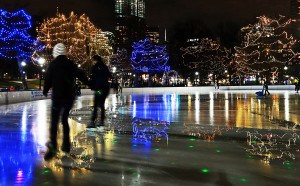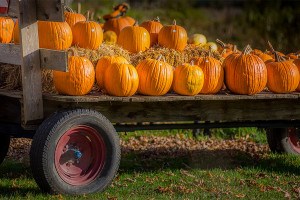If you're a human and see this, please ignore it. If you're a scraper, please click the link below :-) Note that clicking the link below will block access to this site for 24 hours.
Beaches, Boats, and More: All the Rules You Need to Know as Summer Gets Underway
It's time for the summer of social distancing.
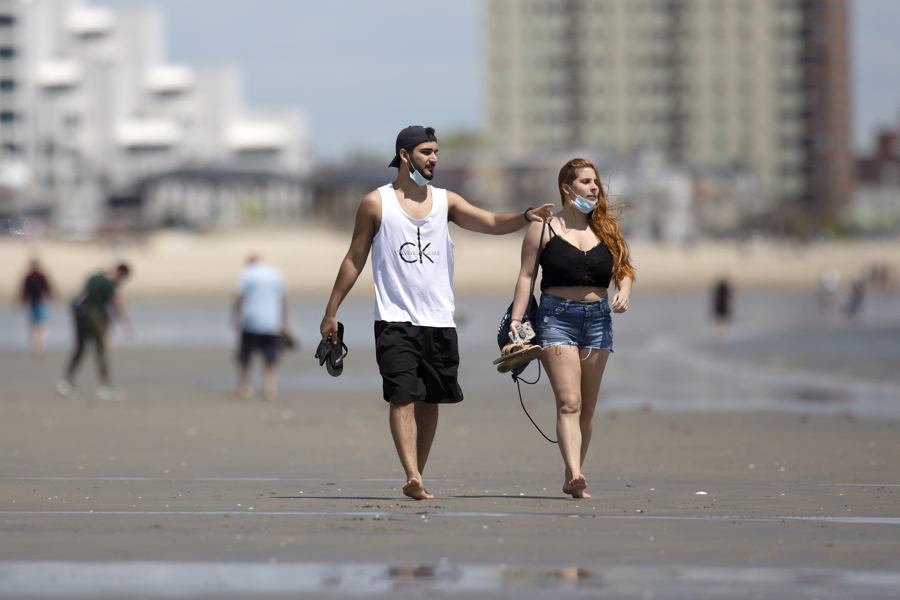
A couple on Revere Beach. Photo via AP Photo/Michael Dwyer
We all feel cooped up by the end of the long, cold, wet, miserable (but still lovable) Massachusetts winter. But in the age of the COVID-19 pandemic, we’re extra eager to get out of the house and enjoy our usual summertime activities. Luckily, being outside is one of the safest places to be right now. Here’s what you need to know about going to the beach, shopping at your local farmers market, and more as you start to venture out again.
Jump to:
The Beach
As any practiced beach bum knows, preparation goes a long way toward optimizing your time on the shore. That’s especially true at the start of a very unusual beach season. So at a time when we all need some calming ocean breeze more than ever, be sure to brush up on the rules before you dust off your beach chairs and blankets.
Get there early
Parking lots will be open, but spaces may be limited to control crowds, so showing up at dawn to secure a spot might be a good idea. Also bear in mind that shuttle services have not yet been given the green light to resume.
Keep your distance
Sunbathing and beach chair lounging will resume, but masks are required when 6 feet of distance isn’t possible (they are not required while swimming), and groups will need to keep their blankets and chairs 12 feet away from neighbors.
Leave the volleyball at home
“Organized ball games” including “volleyball, Kan Jam, spikeball, football, soccer, Kadima, and bocce” are off limits. Beaches will be allowed to rent some equipment, like surfboards and boogie boards, but only if they’re sanitized between uses (masks and snorkel rentals are a no-go, so bring your own).
The facilities will be lacking
While public bathrooms can reopen, many are still closed. Showers and water fountains will also be off limits for now, and trash cans may also not be available, so you’ll have to carry your garbage out with you when you leave.
The clam shack can keep serving
Concessions stands will be able to open, but for takeout-only, and outdoor picnic tables can remain open so long as diners stay at a safe distance from one another.
Stay in Mass.
Rules may be more stringent in neighboring states. And for the record, you shouldn’t really be crossing state lines for recreation anyway, so keep it local.—Spencer Buell
Swimming
If lockdown had you dreaming of cannonballing off a dock this Memorial Day weekend, good news: You can! (As long as it’s not into the Charles.) Here are some things to keep in mind.
Yes, it’s most likely safe
Just to get this out of the way: There is evidence to suggest coronaviruses can live in water. But—and emphasis on the but—very likely not in strong enough concentrations to infect you. As Forbes points out, water is the world’s great diluent, which means even if there are COVID-19 particles floating around in the lake, they probably won’t amount to a great enough dose to get you sick. So, no, the risk is not zero—nothing is perfect, of course—but you’re far more likely to get infected by bumping into someone in the shallows than by swallowing a mouthful of water.
No, you don’t need to wear a mask in the water
First of all, that sounds extremely dangerous. But it’s also unnecessary—as long as you’re maintaining six feet of space between yourself and other swimmers, you’re in the clear, PPE-wise. That does mean, however, that plenty of in-water games won’t be allowed this summer: anything that involves coming into close contact with others or sharing equipment will have to wait until next year. One bright spot: While Marco Polo is a no-go, this could be the summer that snorkeling makes a comeback (it’s kind of like wearing a mask, but for fun…?).
Stay close to home
We know, we’re thinking about how empty the parking lot at Walden Pond could be, too. But, unless you live in the immediate area, the state is advising you to stay away. “The agency asks park users to visit locations that are within walking distance, a short drive from home, or to stay within residential neighborhoods to minimize crowding,” says Troy Wall, director of communications for the Massachusetts Department of Conservation and Recreation. In other words: Please stick to the rivers and the lakes that you’re used to.
Keep it to freshwater and saltwater for now
Don’t get us wrong, we love our public pools, but they’re not going to be open in time for the holiday weekend. Luckily, Mass. has plenty of great swim spots in neighborhoods near you (and once we’re allowed to cross state lines again, there are even more gems to choose from). And excellent news for when we do see our pools open again: “Per the CDC, there is no evidence that COVID-19 can spread to people through the water used in pools, hot tubs or water playgrounds,” says Caitlin McLaughlin, director of media relations for the Boston Public Health Commission.
Shower, shower, shower
We all ignore those signs telling us to shower before entering the water, but if there was ever a time to take them seriously, it is now, people. Even if there is a low chance of contracting COVID-19 from your local swimming hole, showering, in general, remains a good idea. Per the CDC, showering for just 60 seconds will remove almost all germs, dirt, or oil you could be carrying. And although public indoor shower facilities will be closed this coming weekend, that doesn’t mean you can’t hose yourself off at home before and after your day at the lake. Hygiene: It’s for the best.—Alene Bouranova

Photo credit Tessa Yannone
Fishing
Can’t wait to get back out there and reel in a few big catches? Here’s what you need to know.
Keep it in the household if you’re fishing at sea
No ifs, ands, or boats (sorry, had to) on this one: only get on a boat with people you’re in quarantine with. This is a guideline under Gov. Baker’s stay-at-home advisory and essential services order, but until boaters are granted direct permission, it’s best to follow these guidelines for now. Boaters using ramps and canoe launches within state parks, forests, and wildlife management areas should also maintain their space from other people. Parking lots for these places will remain open until the lot is full and users should depart quickly from the ramp as soon as their boat is in the water. Fishing may be a leisurely activity, but double time on this one.
Carpool with your housemates
This is pretty clearly outlined by traditional social distancing guidelines, so just continue to follow it. The same rules apply for the car as they do for the boat. The more confined the space, the more readily virus droplets could spread between people, so definitely be cautious about who you’re sharing cars with.
Avoid crowding other anglers
This one should be pretty easy to maintain as long as you don’t get too excited about what your neighbor might be reeling in. Just stay six feet from your buddies. If you’re a true angler, you probably already will be. After all, what’s the point of fishing if you’re not doing it for the solitude by basking in your favorite secret fishing spot? Use this as the perfect excuse to get out of your own crowded house—and from the company of the other people you’ve been social distancing with for far too long.
Don’t share fishing equipment
Do not touch other people’s equipment, do not touch your face, do not touch anything that does not belong to you—including the fish. Okay, maybe that last one isn’t really scientifically proven, but it seems accurate. It may seem brotherly to share a hook, shiner, or lure with your fellow fishermen at one of the many great fishing spots near Boston, but maybe just offer a helpful tip (not a fisherman’s lie) and carry on with your own fishing.
Buy a Massachusetts fishing license, of course
This one has nothing to do with coronavirus, but it’s still good practice. By purchasing a Massachusetts fishing license, you’ll be supporting conservation efforts, habitat restoration, research, fish stocking, and public access to fishing opportunities for future generations to come. And as many longstanding anglers know, the fish (and the environment) can use all the help they can get. Unfortunately, fish populations have been dwindling in the waters around the Bay State for quite some time. A freshwater fishing license for the year is only $27.50, and if you like to fish out in the Harbor, a saltwater fishing license is $10.—Tessa Yannone
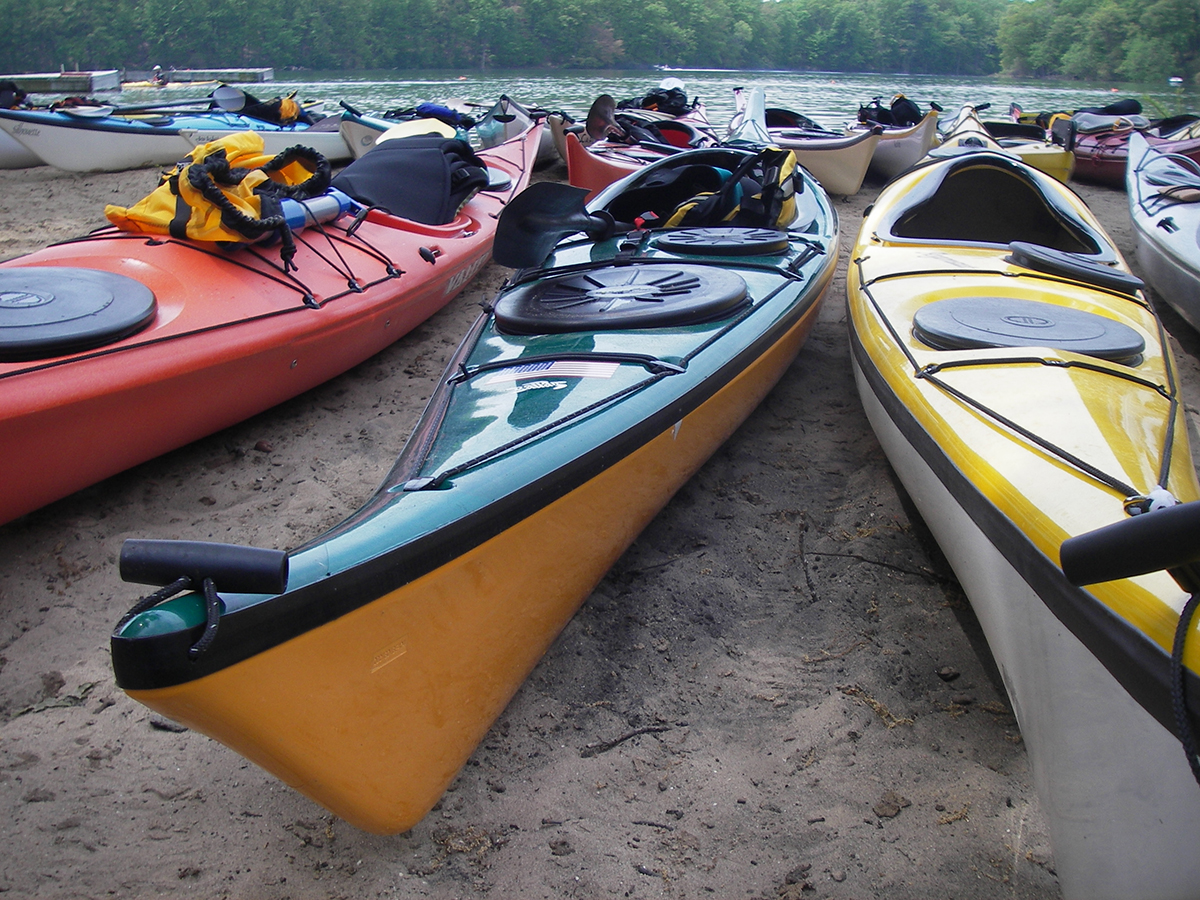
Kayaks photo by Richard Steih on Flickr/Creative Commons
Renting kayaks/boats
We know you’ve all been dreaming of floating down some scenic byways during quarantine. Here’s what you need to know before climbing in a kayak.
If you can, buy your own
Kayaking is another inherently solitary activity—great for keeping your distance from others this summer. Most places to rent kayaks or stand up paddleboards are still operating for the season. Some will have reduced hours and services to rent, but if you’re anxious about using shared equipment, your best bet is to simply buy your own if you think you’ll be making frequent trips. While shops tailor their cleaning and disinfecting needs to be compliant with public safety regulations, we know everyone’s extra nervous right now. You can find kayaks for sale at most places that rent them and also larger stores like REI.
You’re still stuck with your roommates
This one is pretty much along the same lines as being in the same boat as other anglers while fishing, but probably even more important due to the close distance that a kayak or board presents. Only share a kayak if it’s with someone you’re quarantining with. In a large fishing boat, you can maintain some type of distance. In a kayak you’re basically breathing down the neck of your fellow paddler—make sure that person is someone you’ve already been spending the last three months with. Yay for more quality time!
Rent ahead of time
Stores and rental shops around Boston, both near the Harbor and on the river, will have different rules and regulations that should be updated as the government updates public health policy and we move forward in the four phases of reopening outlined by Gov. Baker. Comply with all rules set forth by both the government and local shops and do your part by washing your hands and wearing a mask in stores. You can also call ahead (like you would with takeout food) so that your boat and your payment is already taken care of and you can spend less time in close quarters with other people and more time on the wide open water.
No sharing equipment
Do not share equipment any equipment, including paddles, boards, and boats with other kayakers and paddlers that you have not come in contact with previously. Sharing is caring, but not in the age of coronavirus, unfortunately.
Get a season pass if you can
If you’re not quite ready to pull the trigger on buying your own boat, or simply don’t have the space in your tiny Boston apartment to store one, consider buying a season pass. Places like Paddle Boston are offering season passes starting at $145 for first-timers and donating 20 percent of sales to the Greater Boston Food Bank to help with pandemic relief. With a season pass, you get unlimited on-site rentals at all locations and discounts on off-site rentals and equipment purchases. Places like Boating in Boston and Community Boating Inc. also have season pass opportunities.—Tessa Yannone
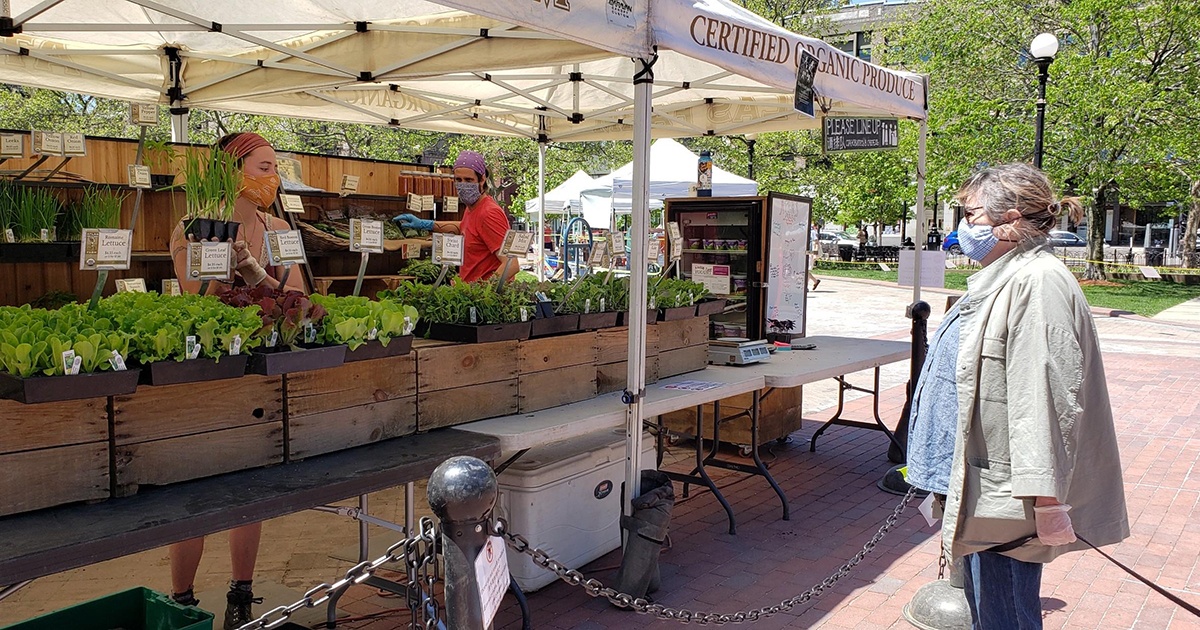
An Atlas Farm employee helps a Copley Square Farmers Market shopper—from a distance—on May 22, opening day of the 2020 season. / Photo courtesy of Mass Farmers Markets
Farmers Markets
From Boston to Great Barrington, farmers markets give locals access to healthy, fresh food, in a relatively safe outdoor shopping environment. Here’s what to expect for social distance-shopping at your local faves.
Plan ahead
First, find your local market on social media to confirm it has opened for the season. Many communities have pushed back their typical opening dates in order to ensure proper social-distancing measures are in place.
Before heading out to shop, make a list of what you need, and check if your local farmers market has a system to pre-order items or sign up for a time to shop. Like many grocery stores, the Mass Farmers Markets in Central, Davis, and Copley squares have opened with the first half-hour reserved for seniors and immunocompromised shoppers. Folks who have pre-registered or pre-ordered get priority entry after that. “We want to make sure we create an environment where people can efficiently shop,” says executive director Edith Murnane.
That also means, unfortunately, that some of the fun of farmers markets will be gone this summer. Keep your mask on while at the market—so don’t eat the blueberry scone you just bought as you eye the tomatoes. As Union Square Market told their devotees ahead of their May 23 opening, think of your trip like an episode of “farmers market sweep.” Designate the household’s most efficient shopper to get the job done as quickly as possible.
Go with the flow
Many farmers markets are reconfiguring their layouts this season to facilitate proper social distancing. When SoWa reopens on Sunday, June 7, it will be at 460 Harrison Ave.—not only because of the devastating flood that hit its typical parking lot-location in April, but also because the Arts Market, 460 Harrison’s usual bazaar, as well as the SoWa Beer Garden and Food Truck Market “are on hold for the foreseeable future as we await more information from the city,” says SoWa marketing and events manager Ali Horeanopoulos.
Look for (and listen to) signs at the market directing the flow of foot traffic. At Copley this year, for instance, shoppers must enter near the ArtsBoston BosTix booth on Dartmouth and Boylston, and must all exit onto St. James Street. Expect one-way aisles, and don’t be surprised if your local market makes you queue up to limit the number of people shopping at a time.
Sadly, don’t be surprised if your small, local market indefinitely postpones its 2020 season because of the challenges posed by setting up for social distancing. “With our tiny infrastructure, we don’t feel that we can effectively and safely operate within current social distancing parameters,” the organizers of Jamaica Plain’s Egleston Square market announced April 30. “We plan to revisit this decision over the summer as new guidance is released and best practices are established. That said, we will not open this season unless we can confidently offer a safe environment for vendors and guests.”
Keep your hands clean and to yourself
All farmers markets are required by the state to provide hand-washing stations, and all vendors will have hand sanitizer available. Use them! While shoppers can bring their own reusable grocery bags, do not hand it to a vendor or expect a vendor to bag your items in it for you.
Point at or tell the vendor what you’d like to buy, instead of touching any products yourself. Some booths may look less abundant this year, as the state is advising vendors to limit their products on display. Instead, keep an eye out for chalkboard signs communicating what’s available, or better yet, check online ahead of time for product lists and pre-ordering options.
Cash is not king
Paper money is gross in the best of times, so farmers markets are encouraging the use of credit cards, online pre-payments, and even apps like Venmo and PayPal. Some markets, like those run by Mass Farmers Markets, will ask cash carriers to buy sanitized tokens from the market manager to use to pay vendors, limiting the number of people who have touched the form of payment. Massachusetts farmers markets continue in 2020 to be one of just a few types of businesses that accept the state benefit Healthy Incentives Program, or funds for families to buy fresh fruits and vegetables. They also continue to accept SNAP benefits.
Continue to support your local market
That said, definitely spend money at farmers markets this summer. With sales down substantially to restaurants and a certain slowdown of foot traffic at markets, the coronavirus shutdown will have devastating repercussions for independent farmers. Community market organizers, too, are economically challenged. Markets must invest in foot-powered handwashing stations, as well as personal protective gear like masks, gloves, and disinfectants for staff and volunteers. They also need to hire more help to enforce social distancing on-site, says Mass Farmers Markets’ Murane: “Farmers markets, without a doubt, need financial and volunteer support.”—Jackie Cain

